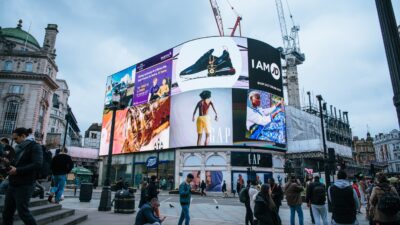Sandra Peter and Kai Riemer

Patagonia goes profit for purpose
This week: we discuss what happens when a company is owned by a foundation, how profit benefits purpose.
Sandra Peter (Sydney Business Insights) and Kai Riemer (Digital Futures Research Group) meet once a week to put their own spin on news that is impacting the future of business in The Future, This Week.
The stories this week
03:47 – Patagonia transfers ownership to a non-profit
Other stories we bring up
Elon Musk’s Boring Company is selling Burnt Hair cologne. We are as confused as you are.
Patagonia’s purpose-driven business model
Our previous conversation on Patagonia’s anti-growth strategy on The Future, This Week
Patagonia’s radical business move is great – but governments should be saving the planet
Patagonia and the new standard for business responsibility
Repair, share and recycle your gear at Patagonia
Our podcast with Rae Cooper and Ranjit Voola on what is business for?
Follow the show on Apple Podcasts, Spotify, Overcast, Google Podcasts, Pocket Casts or wherever you get your podcasts. You can follow Sydney Business Insights on Flipboard, LinkedIn, Twitter and WeChat to keep updated with our latest insights.
Send us your news ideas to sbi@sydney.edu.au.
Music by Cinephonix.
Dr Sandra Peter is the Director of Sydney Executive Plus and Associate Professor at the University of Sydney Business School. Her research and practice focuses on engaging with the future in productive ways, and the impact of emerging technologies on business and society.
Kai Riemer is Professor of Information Technology and Organisation, and Director of Sydney Executive Plus at the University of Sydney Business School. Kai's research interest is in Disruptive Technologies, Enterprise Social Media, Virtual Work, Collaborative Technologies and the Philosophy of Technology.
Share
We believe in open and honest access to knowledge.
We use a Creative Commons Attribution NoDerivatives licence for our articles and podcasts, so you can republish them for free, online or in print.
Transcript
Disclaimer We'd like to advise that the following program may contain real news, occasional philosophy, and ideas that may offend some listeners.
Sandra Patagonia being run as a not-for-profit foundation has generated a lot of headlines over the last couple of weeks.
Kai But there's actually more behind those headlines. So let's unpack this.
Sandra Let's do it.
Intro From The University of Sydney Business School, this is Sydney Business Insights, an initiative that explores the future of business. And you're listening to The Future, This Week, where Sandra Peter and Kai Riemer sit down every week to rethink trends in technology and business.
Kai So before we get to Patagonia, there's been other things. The Nobel Prize in Economics has been awarded.
Sandra Yes, Ben Bernanke, the former US Federal Reserve Chairman, together with a couple of other people, Douglas Diamond and Philip Dybvig, have won the Nobel Prize for Economics. And that's for research that changed our understanding of financial crisis.
Kai Which seems fairly topical not only because we've just had one, 12-15 years ago, but also because we seem to be on the brink of another one.
Sandra That's one of the reasons we're not going to unpack the story in great detail today is because we expect very soon we will be bringing this up again.
Kai Fear as much as expect, yes, but.
Sandra Yeah. And it should be noted that this is research they did back in the 80s, actually looking at the Great Depression and trying to explore how banks and propping up banks are not allowing banks to fail, how that would actually stave off a Depression.
Kai And they got proven right by what the Fed did around the 2008 crisis after Lehman Brothers collapsed.
Sandra Yet back then the Fed and the US Treasury Department teamed up to prop up the major banks, slashed short term interest rates to zero, and set up unprecedented lending programs to support the economy. And collectively those steps really fortified the big banks in the US and staved off a deep, deep recession. And again, we've seen the same thing happen in the wake of COVID-19.
Kai So that's the Nobel Prize in Economics and you think that's big news, but there was even bigger news.
Sandra Yes, I think you're referring to the Meta news.
Kai Yes. Meta announces legs. Meta ran a loss of about $6 billion in the first half of 2022. On Reality Labs, they announced avatars now have legs.
Sandra That is avatars in Meta, Facebook's Metaverse where people used to have these disembodied torsos floating around. They now have legs.
Kai We're excited.
Sandra But this was not even the weirdest news this week, if we're talking about weird news.
Kai No, you might remember we used to have this segment. It's a Musk.
Sandra This was an actual musk. Elon Musk's Boring Company is selling burnt hair cologne. And I really liked the first sentence in the Mashable article which said, "we are as confused as you are". We're with you, Mashable.
Kai And people thought we were talking about, you know, Elon Musk, now actually buying Twitter which he might or might not do. But I think the bigger news is that The Boring Company is now selling the smell that you get when you use their flame thrower not quite in the right way, burnt hair.
Sandra And they do describe it as the "essence of repugnant desire".
Kai A real musky smell.
Sandra 100 bucks!
Kai For burnt hair.
Sandra Musk's scent.
Kai You can get that smell much cheaper. Don't try that at home.
Sandra So let's talk about Patagonia..
Kai Our main story is from the Harvard Business Review. It came out a couple of days ago, "What Happens When a Company (Like Patagonia) Transfers Ownership to a Nonprofit?"
Sandra And to be fair, Patagonia did transfer ownership to a non-profit about four weeks ago. And the story has been in the news since then. Over the last few weeks we've had quite a few guests on The Future, This Week, but we did want to cover this story because it's a really interesting take on how you think about sustainable companies.
Kai So on September 14, the owner of Patagonia, Yvon Chouinard, publicly donated all of his voting stock to one trust and all of his non-voting stock to another trust. So one trust will be in charge of running the company and all the proceeds will go to a non-for-profit, dedicated to fighting climate change.
Sandra So every year Patagonia will donate the money it makes after reinvesting money into the business to this charitable foundation, the Holdfast Collective, and it will still donate 1% of its sales every year to grassroots environmental charities. This is something they've done for many, many years. But instead of going public, and Patagonia has never been public, Yvon mentioned in a statement on Patagonia's website that instead of going public, you could say they're going 'purpose'.
Kai Not private, not public, but purpose. So the main shareholder of the company will be this foundation. So all the dividends, or the proceeds that would normally go to shareholders will now go towards this one big purpose of "fighting the environmental crisis and defending nature", according to the company.
Sandra And this follows Patagonia's kind of 50 year quest to shield the company from focusing on short-term investing and profit-making. It's one of the reasons that Yvon always put forward for why he's never taken the company public, so he wouldn't have pressured to grow faster than he thought was sustainable, which he deemed was around three or 4% a year, and also builds on Patagonia's long standing commitment to be an ethical company. Patagonia has always stood for selling more durable and more lasting goods. very famously they went beyond having kind of robust environmental and animal welfare principles, and water sustainability, and good working conditions for their people and in their production facilities. They went far beyond that a few years ago with their repair and reuse program. This was a big initiative that they started, it included their big ad in the New York Times on Black Friday.
Kai "Don't Buy This Jacket", basically.
Sandra Yes. Don't buy it, sell your old one, bring it in, and we'll repair it for you use it, donate your old one to charity and only buy this if you really, really need it.
Kai It didn't quite work. Lots of people started buying the jacket and the company did quite well in the wake of the ad.
Sandra Yeah, the sales went up by about 30%. Notwithstanding, his point was that the commitment really should be to fight overconsumption rather than just an ethical commitment to producing more and more sustainable goods.
Kai And so with this history of defending the company, and not taking it public, you might ask why would they do this now? And it's likely two reasons. One is Yvon is not getting any younger. He's now 83 years old. So he's thinking about protecting this purpose-driven mission. And the other is that only quite recently in 2018, did the US tax law change and actually allow the 100% ownership of a corporation by a foundation. So this is now the moment that they have found a way to prolong this legacy by constructing the ownership of the company in the way they now did.
Sandra We have to say this announcement made a big splash in the media, it was covered by all major outlets over the last four weeks, many articles have been written about it. But we should say here, and the article in HBR also makes this case quite strongly, that this form of ownership of shareholder foundations, they've been quite common in places other than the US. And the article mentions Denmark in particular, where 25% of the 100 largest companies in Denmark are actually owned by foundations. And that includes even the biggest such companies, companies that we would all know, like Carlsberg or Novo Nordisk, which are owned by foundations.
Kai And not just in Denmark, in other European countries, such as France, Switzerland, and also Germany, this is quite a common form of ownership, much more common than in the US where this seems to be rather than an exception.
Sandra So we wanted to spend the time today to unpack a little bit what's going on here, because the temptation for many people will be, 'oh, well, such companies will not do really well financially'.
Kai They don't have the drive, right?
Sandra Exactly, they're not going to be competitive in the market. And not only has Patagonia been extremely profitable and competitive in the market, but there is also good research on how such companies have fared, as we said outside of the US they do exist. So we actually know that financially, they have a good chance of doing really well.
Kai So in research from Denmark, researchers have shown that foundation-owned firms not only have more consistent growth, they're also less volatile during crises, and they do invest more in research and development as well.
Sandra And the research cited also in the HBR article shows that such companies actually can go on to outperform their competition on a number of fronts, including the financial one. And the example that they gave is the Bosch Group in Germany, and many of our listeners probably own a Bosch tool if they've been to Bunnings lately.
Kai They should also open the hood of their car, likelihood is you will find the Bosch logo in there and a lot of the electrics in cars are fabricated by Bosch and then sold to all major car companies.
Sandra 94% of the Bosch group is owned by the Robert Bosch Foundation, and about 5% of what's left is owned by their family. And this would be in stark contrast to their major competitor that is also out of Germany, that Siemens group, which is owned by investors like BlackRock and other private investors.
Kai And to my surprise, actually, they are now similar size. I think, in the past, Siemens has been the bigger company, but on both turnover and net income, they are now comparable. 80 billion euros in sales, and about 5 billion euros in net income.
Sandra So they're really, really sizable companies. And they're competing quite on equal footing. However, the Bosch Foundation spends a lot more in philanthropic donations, about 10 times as much as the Siemens Foundation. And over the last couple of years during COVID-19 Bosch has proven to be much more resilient in the face of economic hardships.
Kai And offering more stability to employees as well. The research also mentions the great recession when Siemens had mass layoffs and Bosch was able to keep its people employed throughout the crisis, made possible by the fact that they do not answer to commercial shareholders and are not subject to the same short-term pressures.
Sandra And the same Danish research also makes the case that it's not just about similar, or often superior, financial results that these shareholder foundation-owned companies have. It can also be about the longevity of the companies. They seem to not disappear as quickly as conventionally owned firms.
Kai And that makes them attractive for family-owned businesses or individually-owned businesses, especially those that come with a certain legacy with a purpose as vehicles to protect those interests in the long run.
Sandra And there's one more kind of obvious thing that we should highlight here. And that has to do with the normal trade-off that many companies experience between a focus on profits for shareholders, but also thinking about how they can maximise their philanthropic footprint.
Kai As the Bosch versus Siemens example shows, right? Any proceeds of the Siemens Foundation come at the expense of maximising shareholder value. Whereas in Bosch, all the value can go either back into the company or towards the foundation, there are no external shareholders that want their share.
Sandra So basically, when you try to maximise shareholder returns, you're also maximising what you're charitably giving away.
Kai Yeah, so these are not in conflict in this construct that Patagonia has now built around this company.
Sandra And all this allows us to talk a little bit about the bigger picture. There are many companies that are not owned by foundations, by trusts.
Kai Most companies, yeah.
Sandra Most companies are not, but they still have a commitment to purpose. They still think beyond just their shareholders, whether that's employees or whether that's environment, local communities, other stakeholders in the business. But quite often, no matter how well-intentioned these initiatives are, they come in conflict and often get sacrificed...
Kai On the altar of shareholder value. There was one article in the conversation that mentioned the Business Roundtable, an organisation coming together in 2019, representing 200 chief executives of top companies in the US, such as from Apple, BlackRock, Walmart, JP Morgan, making a commitment towards purpose, trying to recast the balance between shareholder primacy and the social goods that companies can do.
Sandra And this was part of a more long-standing movement towards more responsible capitalism, more balanced capitalism, and the 200 chief executives signed a pledge, a non-binding pledge, to be equally committed to their suppliers to their employees, to their communities and the environment.
Kai But despite the pledges of many of these leaders, their companies have found it very hard to actually tangibly move away from shareholder primacy. Research has shown that by many have updated their governance guidelines, very few have made any inroads to devaluing shareholder value. And the researchers examined 26 proposals put before the annual general meetings each one of them voted down by the majority or to shareholders.
Sandra These were 26 proposals that had the goal of practically implementing some of the roundtable statements. But unfortunately, current incentive structures and systems in place in organisations make it very difficult to implement any such changes. And as you mentioned, 100s of those companies that had changed their governance guidelines had made no changes that would in any way alter their statements of corporate purpose or implement new structures that would incentivise people to prioritise a commitment to say, the environment or their communities or their employees.
Kai And that's not to say, of course, that those companies don't care, because the pledge demonstrates otherwise. It just goes to show that systemically it is very hard to change the systems from within.
Sandra And that's why moves like the new tax legislation passed in the US allowing charitable foundations to own 100% of voting rights in a corporation actually are an important mechanism to change the structures, the incentives, that will allow companies to act in different ways.
Kai And so overall, this is a really good news story. Patagonia finding a way of protecting its mission for the long term. But it wasn't without its critics. One of the main criticisms to this model was that it won't make much of a difference.
Sandra That is to say that people will still buy a lot of stuff that they don't need, and there'll still be this huge burden on the environment to begin with. Because, you know, people are still buying these jackets, and most of our clothes still end up in landfill every year anyway.
Kai Yeah. And so people are pointing to the ad that Patagonia famously ran, 'Don't buy this jacket', which increased their sales by 30%. But the counter argument to this would be that I'd rather buy a Patagonia jacket now, where all the proceeds go towards fighting climate change, then a competitor's product where the proceeds might go to individual shareholders. So what this criticism forgets is that the Patagonia model exists in an overall system, and that there might be this substitution effect, all jackets bought from Patagonia will not be bought from other companies. So the incentive really is to build more of these models to actually have this positive social or environmental effect at the expense of you know, more traditionally structured businesses.
Sandra And there was another criticism that's been raised over the last few weeks. And that is to say that having companies like Patagonia move towards this model and contribute to fighting climate change does not address the underlying economic system or political problems that have created these issues in the first place. And that billionaire philanthropy, no matter how well intentioned, should not be seen as the solution to these issues. And there's the Bill and Melinda Gates Foundation, or, indeed now the Patagonia Holdfast Collective spending all this money to fight these issues. However, it does seem that increasingly we defer to billionaires and business owners to take on matters that should actually be addressed by a democratic community voting for these issues to be solved.
Kai But again, we do for the time being live in this economic system. And so the beauty of the solution is, and the change in taxation law in the US has made this possible, is to find a solution that works within the system that still has at its heart the running of a commercially-oriented company, but that uses the system to actually do good. So the foundation that runs the company will have every incentive now for the company to do well in the long-term, not to maximise individual shareholders profit, but to actually maximise the proceeds that go towards the holdfast collective, basically aligning the, you know, capitalist, profit-maximising goals with the maximising of the social good.
Sandra And maybe this is also a way forward for Elon Musk buying Twitter. After all, he's spending 40 billion of his own dollars to acquire Twitter, maybe he can now put it into a charitable foundation and make sure that the proceeds go towards protecting free speech and democracy.
Kai And governments can create further incentives for individuals for foundations to actually invest in publicly listed companies to take them private and maybe turn them into foundation run businesses.
Sandra I think that's all we have time for today.
Kai Thanks for listening.
Sandra Thanks for listening.
Outro You've been listening to The Future, This Week from The University of Sydney Business School. Sandra Peter is the Director of Sydney Business Insights and Kai Riemer is Professor of Information Technology and Organisation. Connect with us on LinkedIn, Twitter, and WeChat. And follow, like, or leave us a rating wherever you get your podcasts. If you have any weird or wonderful topics for us to discuss, send them to sbi@sydney.edu.au.
Close transcript















